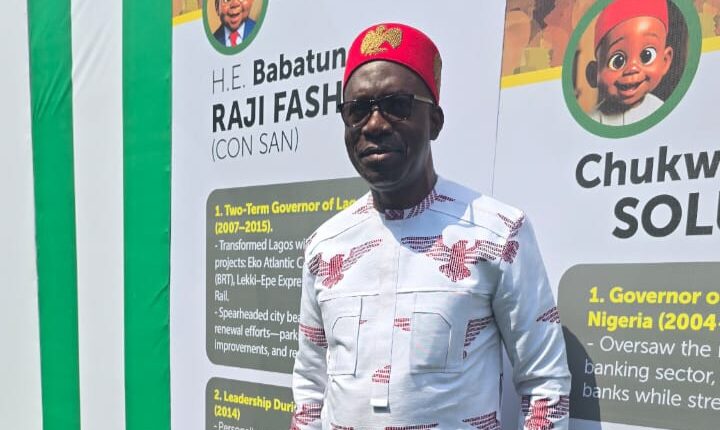
By Christian ABURIME
In a country where every conversation seems to begin with a litany of failures and lamentations of problems, Anambra State Governor, Professor Chukwuma Charles Soludo, CFR, offers a refreshing perspective: the audacity to see Nigeria’s glass as half full.

His Democracy Day intervention challenges the national pastime of lamentation, calling instead for a solutions-oriented approach to nation-building.
This is beyond naive optimism or blind faith; it is strategic hope. Governor Soludo acknowledges that “every Nigerian has his/her long list of what is wrong with Nigeria,” but refuses to be trapped in the familiar cycle of complaints without solutions. His position represents a fundamental shift in how Nigeria’s leaders should engage with the country’s challenges.
Perhaps the most interesting aspect of Governor Soludo’s intervention is his defense of President Bola Tinubu’s economic reforms. In a polity where criticism of government policy is often seen as patriotic duty, Governor Soludo’s endorsement carries significant weight, not because he is a government apologist, but because he has historically been a critic of the very institutions now praising Nigeria’s economic direction.
His admission that he “made a living criticising the World Bank and the IMF” and even “rejected a World Bank loan” as Anambra Governor lends credibility to his current position. When someone who has consistently challenged international financial institutions acknowledges their positive assessment of Nigeria’s reforms, it demands serious consideration.
The metaphor of Nigeria’s economy as a “standing dead horse” in 2023 is particularly vivid.
Governor Soludo’s assertion that the country was approaching insolvency, with potential “mass retrenchment of workers and/or arrears of salaries and pension,” paints a picture of an economy on the brink of collapse. This context makes the current trajectory under the Tinubu adminstration more significant than critics might acknowledge.
Interestingly, Governor Soludo exposes a peculiar Nigerian phenomenon: the selective use of international validation. When global institutions such as the World Bank and IMF criticise Nigeria, their reports are often cited as authoritative evidence of government failure. But when the same institutions offer positive assessments, they are dismissed as “neoliberal, out-of-touch institutions.”
This intellectual inconsistency among government critics reveals a deeper problem in Nigerian political discourse: the tendency to cherry-pick evidence that supports predetermined positions rather than engaging with facts objectively. Thus, Governor Soludo’s call for “rigorous counterfactual analysis” and “credible alternatives” challenges critics to move beyond rhetoric to substantive policy alternatives.
Yet, one of Governor Soludo’s most insightful observations also concerns Nigeria’s relationship with its past. He notes that “every year, people celebrate the previous year(s) as the ‘good old days,’ and every new regime points out how it is the only one to bring positive change since the world was created.”
This nostalgia trap is particularly dangerous for a developing nation like Nigeria. When every period is retrospectively romanticised, it becomes impossible to acknowledge genuine progress or build on incremental improvements. The constant narrative of decline creates a self-fulfilling prophecy of pessimism that undermines confidence in collective action.
Governor Soludo’s inventory of commonly proposed solutions, from restructuring the federation to tackling corruption, from ensuring security to providing infrastructure, reads like a greatest hits compilation of Nigerian political discourse. The list is comprehensive, familiar, and largely uncontroversial.
But here lies the paradox: if everyone knows what needs to be done, why hasn’t it been done?
Governor Soludo’s answer is implicit but clear: the real challenge is not identifying problems or proposing solutions, but navigating the “HOW” of implementation, especially given “binding resource constraints and distributional consequences.”
This distinction between knowing what to do and actually doing it represents the gap between political rhetoric and governance reality. It is easy to prescribe solutions when you are not responsible for their implementation or consequences.
That’s why Governor Soludo’s deliberate choice to “focus more on what is right with or working in Nigeria” is more of strategic necessity than a personal philosophy. In a country where negative narratives dominate public discourse, someone needs to document and celebrate progress, however incremental.
This does not mean ignoring problems or avoiding difficult conversations. Rather, it means approaching challenges from a position of strength and possibility rather than weakness and despair. When leaders model this approach, it can shift the entire national conversation from what is wrong to what is possible.
By the way, Governor Soludo’s challenge to critics to provide “rigorous counterfactual analysis and credible alternatives” notably enriches national discourse. This demand for intellectual rigour raises the bar for political criticism, moving beyond emotional reactions to evidence-based assessments.
The observation that “the task is always easy especially if you are not the one doing it” speaks to the responsibility that comes with offering alternatives. It is one thing to criticise from the sidelines; it is another to propose solutions that account for political, economic, and social realities.This ultimately calls for a cultural shift in how Nigerians engage with their country’s challenges. Moving from a lamentation culture to a solutions culture requires intentional effort from leaders, intellectuals, and citizens alike.
In our national expedition toward sustainable nationhood, it is crucial to always bear in mind Governor Soludo’s words that “we must appreciate how far we have come” while acknowledging “we still have a very long way to go”. The choice between seeing Nigeria’s glass as half full or half empty is not just about optimism; it is about the kind of country we are building. Nations built on narratives of perpetual failure rarely transcend those narratives. But countries that acknowledge progress while working toward greater achievements create momentum for continued improvement.


